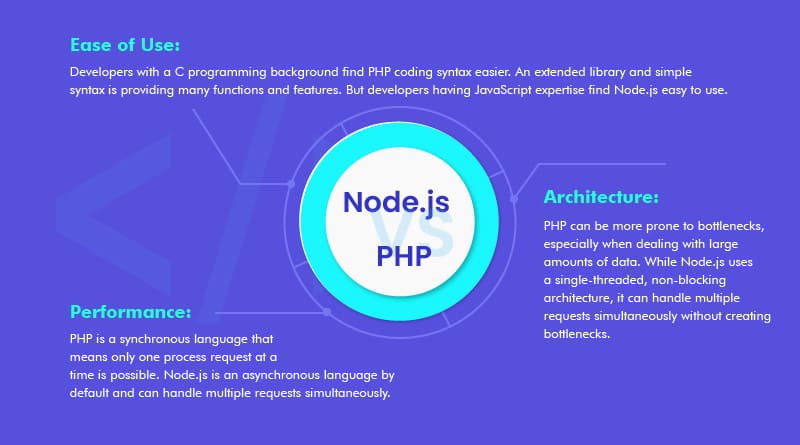Computer programming is something ruling today in the digital era.
We all love computer applications to use! Whether it is an online game or a daily food delivery app. These applications have become our day-to-day part.
But are you aware of the frameworks used in building these applications? PHP and Node.js are two popular ones that we will discuss in this blog.
In this Node.js vs PHP battle, deciding the winner is challenging.
NodeJS vs. PHP is something that many developers are also stuck with because they aren’t able to figure out the right ones.
To make the task easier, we share the right information on PHP vs. NodeJS. Let’s dive into it!
History of PHP
Knowing their history is a must before we delve deeper into the node vs PHP information. It will help you know the background of the programming framework.
PHP was introduced in 1993 by Rasmus Lerdorf. Earlier, it was called Personal Home Page but evolved later as a Hypertext processor.
We will not brief you more about the PHP history because it has already been covered in our PHP vs JavaScript blog. Do give a quick read and get all valuable insights.
Significances of PHP Framework
Since its beginning, web developers used PHP for back-end or server-side programming. And like other technologies, it also evolved. Other technologies like Linux, Apache, MySQL, and PHP (LAMP) stack.
This bundle of software is now popular, where immensely powerful applications are built. PHP is an open-source platform to build dynamic websites and applications. These applications require PHP hosting infrastructure, for online scalability.
The LAMP’s influence on web development is very much because developers freely share codes and collaborate on multiple projects.
As a result, internet growth is tremendous, which we are experiencing.
If you don’t believe us, just remember that 70% of existing websites are built on PHP.
The History of Node.js
Let us take you back down the memory lane when Node.js was created. In 1995, Netscape created JavaScript to enhance the interactivity of websites. Very quickly, it becomes a front-end development choice for developers.
Then, it emerged as an alternative to PHP for accomplishing web development projects. Today, several mobile apps and games leverage this framework. Why? The reason we mentioned is higher interactivity.
Well, that was the part of JavaScript. Now, let us share some information about Node.js. In 2009, Ryan Dahl introduced this fast, scalable, and efficient framework to build back-end applications. Since then, it become an infamous name in the web development arena.
Big giants like Netflix, eBay, and PayPal use this tool for web development. Many front-end developers also use this framework with basic JavaScript expertise.
Significance of Node.js
There is a massive support community for Node.js. So, beginners, if they are stuck in any web development process, the community will assist them. Also, Node.js hosting team members or knowledge resources are available after the website is live.
But this popularity of Node.js is possible because of the scalability. It is single-threaded by nature, which makes JavaScript execution much faster.
For greater speed and performance, C and C++ computer languages power Node.js.
For icing on the cake, you must know that cross-platform support makes Node.js a favorite choice for developers.
Related: Node.js vs Express.js: Which One You Should Opt For?
Head-to-Head Comparison: Node.js vs. PHP

Are you done with revisiting the history pages of Node.js and PHP? Now, it’s the time to let them do tug of war, and as a reader, you see who wins!
1. Ease of Use
The first factor, is usability. Developers with a C programming background find PHP coding syntax easier. An extended library and simple syntax is providing many functions and features.
But developers having JavaScript expertise find Node.js easy to use. After all, they understand its basic fundamentals. There is also a large ecosystem of libraries and frameworks to make web development tasks easier.
2. Performance
Next, performance matter whether it is a website or a machine. No one loves inefficiency, right? When it terms to handling requests, PHP is a synchronous language that means only one process request at a time is possible. A task will be processed until it has been completed before the server moves on to the next request. This can be inefficient when you must process a high volume of requests simultaneously.
By contrast, Node.js is an asynchronous language by default and can handle multiple requests simultaneously. Whenever you make a request, the server passes it to a worker process and moves on to the next one. When working with a high volume of requests, Node.js is more efficient than PHP because it allows the server to handle multiple requests simultaneously.
3. Architecture
Traditional web applications are best suited to PHP. Each request is handled by a separate thread in a multi-threaded, blocking architecture. Because of this, PHP can be more prone to bottlenecks, especially when dealing with large amounts of data.
While Node.js uses a single-threaded, non-blocking architecture, it can handle multiple requests simultaneously without creating bottlenecks. In this way, it is better suited to applications that require high concurrency levels and real-time updates.
PHP and Node.js are great at what they do, but there are many factors to consider when choosing between them. Real-time applications should be built with Node.js. However, PHP is ideal when integrating or customizing a popular content management system.
There is no barrier to entry for either tool, as they have bustling communities and an abundance of learning resources. You will have all the resources you need to start building successful applications, no matter which one you choose.















